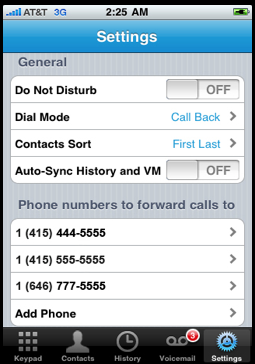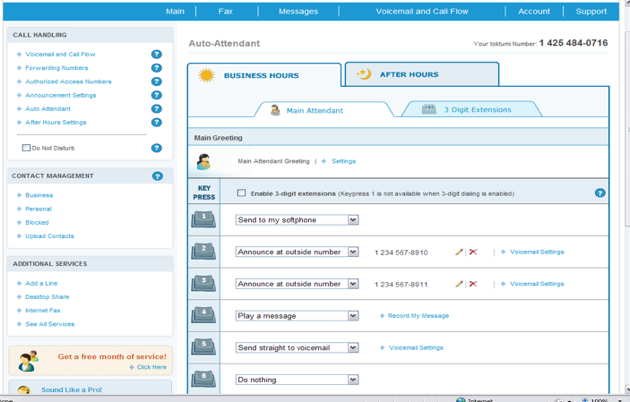 If you’ve been paying attention to the tech news at all over the last week, you’re already very familiar with the outrage that Apple has sparked over its rejection of Google Voice for the App Store, and its ban of all third-party applications that tap into the service. But now the fallout of the Google Voice debacle is having an impact on even more independent developers — Apple is apparently holding off on approving applications that could even be tangentially related to Google Voice.
If you’ve been paying attention to the tech news at all over the last week, you’re already very familiar with the outrage that Apple has sparked over its rejection of Google Voice for the App Store, and its ban of all third-party applications that tap into the service. But now the fallout of the Google Voice debacle is having an impact on even more independent developers — Apple is apparently holding off on approving applications that could even be tangentially related to Google Voice.
The application is question is Line2, which was built by Toktumi, a startup that specializes in helping small businesses use their mobile phones and computers to create office-grade phone systems, even when their employees are scattered across the country. Line2 would allow users to use two different numbers with their iPhones — one which they could hand out for business calls, and the other for personal. This setup would allow employees to keep their personal numbers private, and also allows businesses to set up professional features on the business line, with features like an phone directory (“Press 1 for sales…”) and a single support number that calls the mobile phones of multiple employees. Given how many businesses are adopting the virtual office approach, there’s little doubt that this technology could prove very popular (the recently-released BlackBerry version is already starting to gain traction).
Unfortunately, Line2 is currently sitting in App Store limbo. The app’s developers intitally submitted it on June 5th, and it sat for weeks waiting for approval with no information other than Apple’s automated “this app is requiring unexpected additional time for review” messages. Finally, on June 23, Toktumi learned that the application had been rejected because it required people to pay through its website rather than Apple’s subscription services that are integrated with the iPhone 3.0 update. Toktumi attempted to point out that Salesforce was allowed to offer an application that conducted transactions through the web, but in the end it decided to simply modify the app to comply with Apple’s requests.

The company submitted a new version of the Line2 app on July 13, at which point it was asked to submit a demo account for testing (the company had already submitted one). To no one’s surprise, they got another Email a few days later stating that the process would require additional time. And then the Google Voice bomb dropped. Apple removed every related app on the App Store, citing the rationale that they duplicated existing iPhone functionality and would confuse users.
CEO Peter Sisson was understandably concerned. Line2 doesn’t have anything to do with Google Voice, but it does make use of so-called “virtual numbers”, which relay calls made to one number (like your business line) back to your iPhone number. And it also offers other telephony features that ‘duplicate’ what’s offered by the iPhone. So Sisson reached out to Philip Schiller, Apple’s SVP of Worldwide Product Marketing, who has previously dealt with developers on an individual basis when application approvals have taken unusually long. Sisson sent his Email to Schiller on July 27th — nearly two months since the app was originally submitted.
Schiller responded, stating that he would get back to Sisson by July 29th. That didn’t happen. Sisson sent another message to Schiller with a number of reasons why Line2 was actually good for Apple (it encourages small businesses to use the iPhone) and also pointed out why it wouldn’t cut into AT&T’s revenues (the app doesn’t offer any SMS functionality at all, and all calls are still performed using standard AT&T minutes). Schiller hasn’t responded, and Apple has gone almost totally silent on the matter with no other response than that the application is “still in process”.
At this point, I doubt Sisson will be getting a response any time soon. If Apple did grant approval to the app, it would show that duplicating functionality wasn’t really Apple’s reason for banning Google Voice (of course, countless other apps mimic portions of the iPhone’s functionality). That kind of inconsistency would be nothing new to the App Store, but now that the FCC is launching an inquiry into the marketplace’s approval processes, you can be sure that Apple isn’t keep on taking any chances.
The problem, of course, is that Apple has never established consistent guidelines for developers to follow. That may change soon: the FCC inquiry may force them to change their ways, especially if the process is revealed to be as chaotic as most developers suspect. Until that happens though, we’re only going to keep hearing of more casualties of the App Store’s black box.

Photo by Matt Ryall.